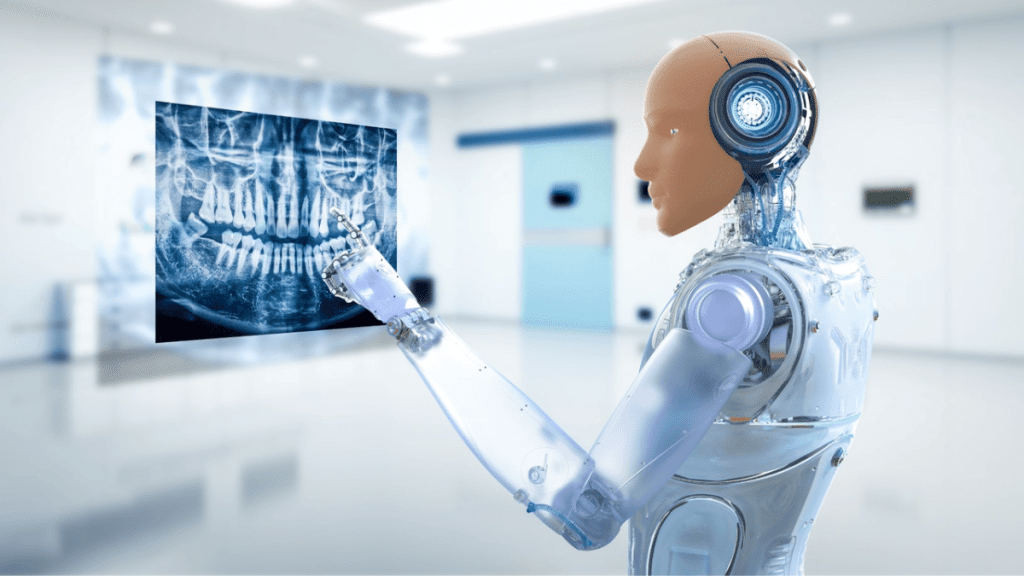AI has left a significant impact on healthcare. From intuitive health monitoring to autonomous healthcare decision-making, AI plays a critical role in healthcare management. AI-based solutions have introduced staggering improvements in different branches of healthcare, including dentistry.
AI’s role in dental care is becoming more focused. Meanwhile, dental care professionals are discovering various ways to leverage the benefits of AI. In this blog, we will explore how dentists can harness the potential of AI to enhance patient care.
How Does AI Work in Dentistry?
AI is a broad dimension of frontline technology, offering various benefits based on the type of industry it impacts. When it comes to dentistry, AI assistants play a crucial role in treatment planning, screening, and diagnosis of issues. Soon, more AI-related benefits in dentistry will be revealed.
With that, readers may want to know: What are the core technologies in AI for dentistry? These are mainly-
. Machine Learning
ML enhances diagnostic accuracy by interpreting a wide range of databases in various media formats, including patient records, scans, and dental images.
. Deep Learning
AI leverages a massive library of neural networks that can interpret complex images to offer unique predictive insights. The vast library can clinically diagnose gum problems, which have multiple shades and layers. Often, fungal infections in the gums remain disguised under plaques.
However, AI identifies symptoms by leveraging insights from a massive library to provide the right diagnosis. Meanwhile, AI can also expose viable oral cancer, tooth cavities, etc.
. Natural Language Processing
AI can help dentists to answer common patient queries. Dentists can also leverage AI to schedule patient appointments and daily itineraries.
. Computer Vision
AI plays a promising role in interpreting visual outputs, such as X-rays and medical imaging scans. Meanwhile, dentists also use AI to interpret other intraoral pictures in a shorter time. The bottom line is that AI intervention helps in quicker issue identification and remediation.
Real Applications of AI in Dentistry
AI in dentistry is still in its nascent stage. Still, we will discuss some critical applications of AI in dentistry here.
. AI’s Use in Dental Diagnosis and Treatment Analysis
AI has a key role in medical image analysis. It assists dentists to gather detailed insights and make more informed decisions. But what does imagery analysis entail?
It includes a detailed analysis of teeth and exploration of cavities, decay, and gum issues. As a result, dentists can plan more effectively. The AI-powered systems also help in 3D model regeneration. It helps medical practitioners to master complex procedures.
AI can not only trace records and create insights. Complex AI algorithms can share relevant information to enhance the cognitive knowledge of healthcare professionals.
. How Dental Image Analysis Helps?
AI combines machine learning to improve the quality of diagnosis. It generates a decent analysis of visual outputs, including intraoral scanning, 3D imagery, and radiographs. These AI tools can accurately detect anomalies like fractures, tumors, and cavities.
AI also offers bias-free ideation and reduces the scope of error. Therefore, doctors can make clinical decisions in healthcare assessments, minimizing errors due to EQ imbalance.
However, readers should note that AI cannot assure 100% perfect diagnosis. Therefore, Doctors need to supervise the AI modules and take responsibility for the directives issued by the AI models.
. Role of AI in Better Invisalign
Orthodontics is responsible for the installation of Invisalign and braces. AI also plays a significant role in this field of dentistry. AI can map the Invisalign construct tailored to the unique dental structure of each patient.
Moreover, AI can also leverage detailed analysis to identify specific pressure points, thereby enhancing the impact of therapeutic interventions. Kunik Orthodontics leverages frontline AI to guide Invisalign designs tailored to each type in the shortest possible time.
AI tools, specifically designed for dentistry, can also aid in cephalometric analysis. It is a detailed study of the equation between the skull and teeth. Development of AI in this domain has made cephalometric analysis more precise.
. AI in Personal Oral and Dental Care
AI leverages an insurmountable amount of patient data. It enables practitioners to autonomously assess medical records and identify problems associated with genetic and lifestyle factors. Therefore, doctors can easily devise treatment plans.
Such AI-embedded treatment procedures help reduce the negative effects of treatment. In the long run, this will help improve treatment efficiency and patient satisfaction.
. Dental Surgeries Assisted by Robots
In dental surgeries, microscopic control is paramount. AI-powered robotic surgeons can do such surgeries with ease. The robots imitate the hand movements of surgeons with greater precision and clinical control.
Often surgeons implement live control on AI robots. On other occasions, robots carry out preprogrammed surgeries with prompt IQ for momentary decisions. But what kinds of surgeries can AI assist with?
AI-embedded robots can especially carry out dental implant operations and jaw reconstruction with ease. Nowadays, AI robots are being trained to make AI-powered surgeries minimally invasive. But how is this done?
The AI-powered robots can leverage a flexible and dexterous approach to assess all hard-to-reach areas. However, these robots are still used in the early stages of treatment, rather than as mainstream solutions.
Counting the Benefits of AI Inclusion
AI adds precision and accuracy in the field of dentistry. In this field of healthcare, AI plays a key role in accurate management. It includes teeth structure analysis and perfect jaw measurements. More such wholesome benefits follow. However, experts argue that the greatest benefit of AI in dentistry in its current stage is the enhanced patient experience.
Many AI chatbots are being designed now for autonomous patient care. AI can thus play multiple roles, such as query resolvers and first aid managers, among others.
From the purview of round-the-clock management, AI leverages better cost and time management. It entails a repetitive process of database management, report creation, and setting optimized workflow schedules in the healthcare setting. The AI integration also goes a long way in reducing human dependency, as a clinical chatbot handles administrative roles.
